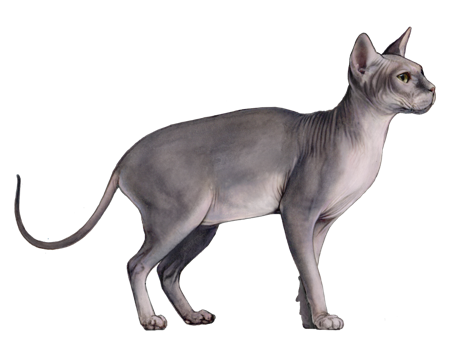
Lykoi
The Lykoi is an intelligent, outgoing breed that gets along well with other cats, people, and dogs. These loyal cats love to spend their days playing. And with a werewolf-like appearance, they're always ready for Halloween.
Interested in discovering if your cat is a Lykoi?
Check out Wisdom Panel's DNA test.
Lykoi Traits
General Appearance
Lykoi are partially hairless cats that resemble mythical werewolves. They're medium-sized with elegant, slightly slender bodies and lean muscles.
Coat and Coloring
The Lykoi's short-to-medium-long coat is soft to the touch. These cats have no undercoat and sparse hair on their legs, feet, and face masks. Amelanistic white hairs and colored hairs intermix throughout the coat to create a roan pattern that doesn't exist in any other cat breed. Lykoi typically come in solid colors, giving them a more dramatic overall appearance.
Distinctive Physical Traits
Some of the Lykoi's key features are a modified wedge-shaped head, tall, erect ears, large, walnut-shaped eyes, and a short tail that tapers to a point.
Lykoi Temperament
Lykoi are fun-loving, high-energy cats. They enjoy spending time with their humans but will rarely choose a lap over a play session. And when no one is around, they'll happily entertain themselves with a toy or any other object they can find.
Some Lykoi exhibit dog-like behaviors. If kept in groups, they may hunt toys like a miniature wolfpack. And many of these active kitties like to fetch and chase. Though they can sometimes be possessive of their toys, they typically share if asked to do so.
Because they lack an undercoat and have hairless patches, Lykoi should stay indoors to prevent hypothermia and sunburn.
Lykoi History
The story of the Lykoi began in 2011 when veterinarian Dr. Johnny Gobble and his colleagues received a pair of unusual kittens that somewhat resembled wolves.
After extensive health evaluations to rule out disease as the cause of their unique appearance, Dr. Gobble began breeding the cats with black domestic shorthairs. The resulting breed earned the name Lykoi—a play on "lycos," the Greek word for wolf.
Over time, Dr. Gobble determined that a recessive genetic mutation caused the breed's partial hairlessness. And that—combined with a roan-patterned coat—is what gives Lykoi their one-of-a-kind look. Dr. Gobble continued to outcross them with domestic cats to ensure genetic diversity and maintain the breed's overall health.
The International Cat Association granted the Lykoi Championship status in 2017.
Lykoi Care
Nutrition
Lykoi need a high-quality diet formulated for their current life stage (e.g., kitten, adult, senior). Most dry foods are too high in carbohydrates for this breed, which puts them at risk for diabetes. So, it's best to stick with canned foods. Experts also advise against free-feeding Lykoi.
To keep your cat at a healthy weight, measure out meals and reduce portions if necessary. And be sure to account for treats. As a guideline, they should make up no more than 10% of a cat's calories.
Lastly, all cats need access to fresh, clean water around the clock.
Grooming
Lykoi don't require much brushing—especially right after they molt, at which time they have almost no hair at all. But they do need frequent baths. Some Lykoi may get blackheads on their skin. This is normal and no cause for concern.
Their grooming routine should also include regular ear cleanings and nail trims. Long nails are more likely to snag on something and become torn or damaged. They can even grow into your cat's paw pads, leading to pain or infection. In addition to clipping, providing a scratching post will allow your cat to do some nail maintenance themselves (thanks to their instinct to scratch).
And don't forget those teeth. Good dental hygiene—including daily at-home teeth brushing and professional exams and cleanings—is essential to every cat's overall health.
Health
Roughly one out of every three cats in the United States is overweight or obese. And those extra pounds can contribute to other health risks—such as arthritis, diabetes, and heart problems. Your veterinarian is the best resource for tips on managing your cat's weight.
Breed Group
Western
The largest of breed groups, the Western Group is mainly comprised of cats developed in Europe and the Americas. Due to the complexity of feline genetic diversity, however, cat breeds from other regions may also be found associated with this group.
Resources
https://tica.org/breeds/browse-all-breeds?view=article&id=852:lykoi-breed&catid=79
https://tica.org/breeds/browse-all-breeds?view=article&id=1614:the-lykoi-breed&catid=48
https://www.livescience.com/52744-werewolf-cat-lykoi-breeding.html
https://cfa.org/wp-content/uploads/2019/06/lykoi-standard.pdf
https://www.banfield.com/state-of-pet-health/obesity
Reviewed February 23, 2021 by Jamie Freyer, DVM
























